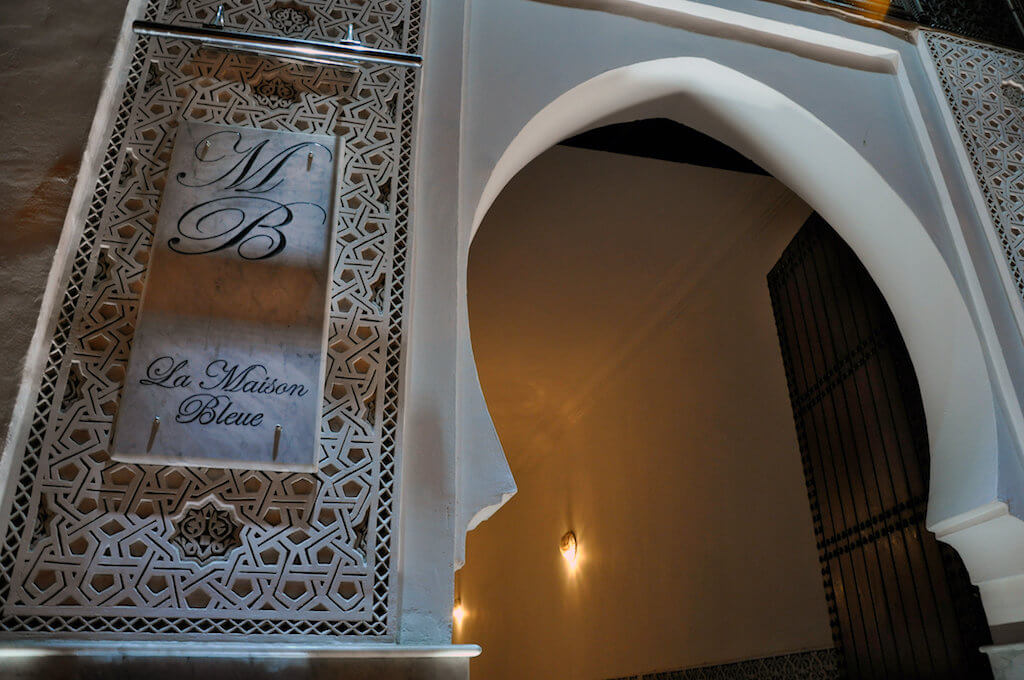A secluded oasis in close proximity to the ancient city of Fes, La Maison Bleue offers authentic Moroccan luxury to travellers from around the world.
Constructed in 1915 by Sidi Mohammed El Abbadi, a prolific judge and astrologer, the family home, which currently doubles as a boutique hotel, is now run by the third generation. The two sister properties – La Maison and The Riad – are consistently rated among the top five hotels in Morocco. With thousands of imitations around the country, La Maison Bleue’s aesthetic is much emulated. The experience it offers, however, is unmatched.
La Maison Bleue’s brand might be steeped in tradition, but the El Abbadi family has fully embraced the digital age. In 1997, the hotel became the first Moroccan business with an online presence thanks to the advice of a forward-thinking collaborator. From this experience, which catalysed the family business’s growth, its proprietors learned that keeping an open mind and getting a second opinion are the hallmarks of successful entrepreneurship.
According to Mehdi El Abbadi, the secret to La Maison Bleue’s preeminent reputation with tourists is simple: they treat guests like family. Moreover, family values are at the core of the hotel’s business sustainability. For El Abbadi, retaining talent is a priority, and this means investing in their development and reciprocating their loyalty.
Tharawat Magazine sat down with Mehdi El Abbadi to talk about inclusivity, open-mindedness and a definition of family that extends well beyond the four walls of his hotel.
What inspired you to turn the family home into a family hotel?
Welcoming guests into our home was a natural progression. The story begins when my grandfather built the house – six rooms and a kitchen. From 1915 onwards, he lived there with his four wives, who each had their own quarters. This may suggest that my grandfather was in charge, but in reality, his wives ran the household.
Altogether, they had 11 children in total – my father being one of them. However, they weren’t told which wife their mother was until they were in their teens. It was simply one large, loving family, with my fourth grandma supervising the kitchen, making meals for four tables a day.
My father and I wished to offer that same hospitality to the world. Thus, when we were renovating the house, we decided to host our first visitors – the clientele of tour operators from all over the globe. We welcomed them to our family, inviting them to dine with us and providing authentic Moroccan hospitality. The experience gave them insight into how Moroccan people live on a day-to-day basis.
We had no idea how La Maison Bleue would be received, and hosting the high-profile guests that began to arrive was initially overwhelming. However, our success made it clear that travellers were hungry for authentic cultural experiences in Morocco, and specifically Fes.
Over the last 20 years, we have injected 30 per cent of our income back into the hotel – a substantial investment that signifies our commitment to family business continuity.
What role does family occupy in La Maison Bleue?
My sister and I have run La Maison Bleue for the last 16 years, focusing on our individual talents to create an exceptional experience for our guests. I manage the day-to-day operations and organise the hospitality, while my sister’s artistry has transformed our family home into an aesthetic oasis.
Our transition from family home to family business was years in the making. Early on, we decided against external financing. Instead, we carefully invested the funds that we had as a family. Over the last 20 years, we have injected 30 per cent of our income back into the hotel – a substantial investment that signifies our commitment to family business continuity.
Although the competition is strong, with approximately 2,000 hotels that mimic our model in Morocco, La Maison Bleue is consistently rated one of the top five hotels in the country. Our success is partly because we treat all of our guests equally; we welcome them with open arms regardless of nationality, religion, upbringing or status. This non-judgemental and inclusive mentality differentiates us from the competition.
How is Morocco’s tourism industry unique?
Tourism continues to grow exponentially in Morocco. Our country is both beautiful and blessed with a history and culture that fascinates international tourists. Also, we are proud of our country’s UNESCO world heritage sites, and many Moroccans regularly return to their hometowns to partake in maintenance and revitalisation. So far, more than 10,000 houses have been restored to their original splendour – some dating back to the 12th century.
Additionally, Morocco is home to people of many different cultures, with a mix of Muslim, Berber and Jewish people all living harmoniously. Unfortunately, this peaceful coexistence is a rare phenomenon. As such, visiting Morocco appeals to people of all backgrounds.
Morocco is home to people of many different cultures, with a mix of Muslim, Berber and Jewish people all living harmoniously. Unfortunately, this peaceful coexistence is a rare phenomenon. As such, visiting Morocco appeals to people of all backgrounds.
[ms-protect-content id=”4069,4129″]
How do you balance tradition with technology?
When I started the business 24 years ago, I was completely unfamiliar with the internet, which was relatively new at the time. I didn’t even consider it as a business strategy. Luckily, I partnered with a UK tour operator who was, at 65 years old, uncannily in touch with the latest trends. He was like my second father and encouraged me to create a website for La Maison Bleue.
We registered our domain in 1997, making us the first in the Moroccan business to go online. It took longer than I anticipated, but the investment – both financially and in terms of time-management – has been well worth it. Currently, the son of that UK tour operator manages our international web presence and PR.
This experience with digitalisation taught me that expert advice is a necessary part of success. I know the Moroccan people and history inside-out, but sharing that knowledge with the world would not have been possible without help. Therefore, it is essential to keep an open mind in all aspects of business, especially when dealing with something unfamiliar or unknown.
What are you doing to ensure the future of La Maison Bleue?
The best way of ensuring our sustainability is to maintain the business at its current size for the foreseeable future. We feel that with the addition of The Riad – La Maison Bleue’s sister house, which brought our room count up to 20 in total – we have expanded as much as we need to, at least for now. Sacrificing the hotel’s identity and authenticity to achieve revenue growth and financial gain is not worth it for us.
Aside from that, when it comes to sustainability, retaining talent is essential. We want to ensure that our team will stay loyal to us in the years to come. So, we treat them as well as our guests, like family.
My sister and I had a privileged upbringing; we went to the best schools and had the financial support we needed to succeed in life. Unfortunately, the majority of people in Morocco are not nearly as fortunate, and this includes many in Fes. Therefore, it is our responsibility to provide excellent opportunities to local people with disadvantaged backgrounds by offering them favourable work opportunities that are, in general, hard to come by. When La Maison Bleue opened, we hired people from a low social standing and invested our time to personally train them, imparting our family values in the process.
The overwhelming majority of those people are still with us today. They are our extended family. Currently, we have a total of 45 employees, which means 45 families in Fes are financially stable. We hope to offer the same level of opportunity to future generations. As much as it depends on our astuteness as entrepreneurs, our longevity as a business depends on their loyalty.
[/ms-protect-content]

